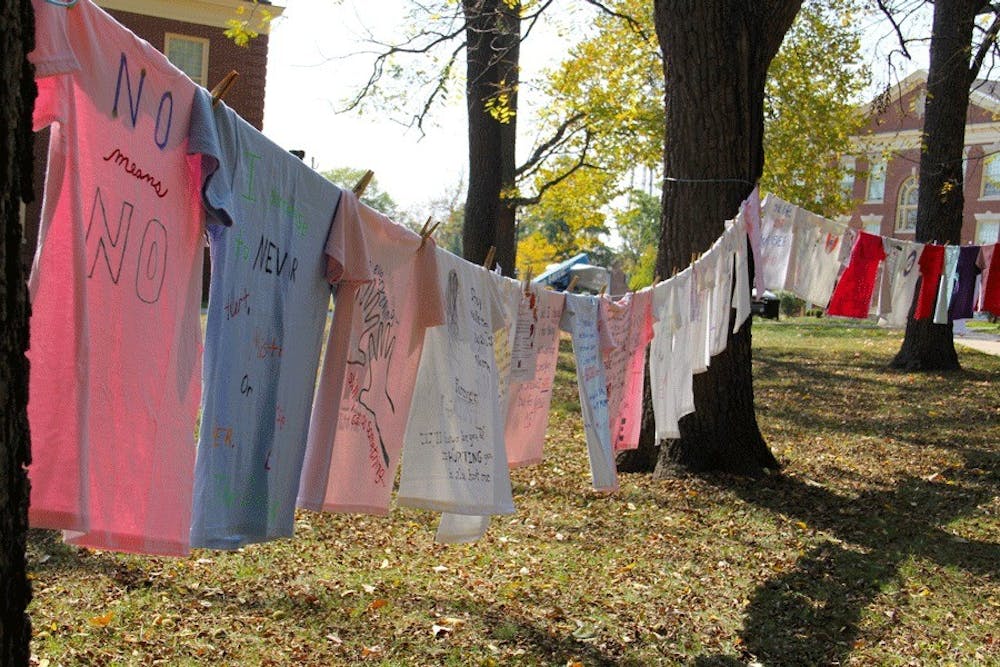Last semester, during a shift at Paesano’s Pasta House, junior Alyssa Burnett went in the back to check her phone and saw two safety bulletin sexual assault report emails.
After realizing that she had to walk home alone, Burnett began making plans. There would be no headphones, no stops in Armstrong and, even though her calves ached from standing all evening at work, no loitering.
She is not alone in her realizations or in her fear.
***
Thirteen reports of sexual assault have been filed since the beginning of the semester, and on Sept. 27, the university sent out its “Annual Security and Fire Safety Report and other Important Information” email. One of the email’s links led to a description of the safety bulletins.
Burnett has a special email folder for safety bulletins. She finds them “stupid” and “ridiculous” and says that “all they do is make you feel afraid.” She wonders why concrete actions to punish perpetrators aren’t publicized by the university and why there are no follow-ups to these emails.
“I want to know ... the consequences,” Burnett said. “If you do this at Miami, this is what is going to happen.”
Junior Katie Carene also reads the email reports but doesn’t find them very helpful.
“One of the problems with the email is that you read it once and then forget about it,” Carene said. “It gets lost in your email thread and in your inbox.”
According to the university’s campus safety and security website, “The purpose of a Safety Bulletin is to enable persons to protect themselves and to heighten safety awareness, as well as to seek information that will lead to an arrest and conviction of the perpetrator when violent crimes against persons or major crimes against property have occurred.”
The Jeanne Clery Act legally requires universities to distribute crime reports to faculty, staff and students. John McCandless, Miami University Police Chief, said that he hopes the reports raise awareness and potentially help with safety measures. The law also requires a list of safety tips, which typically reside at the bottom of the report.
“Women Helping Women, along with other people on campus, helped us to come up with the safety tips,” McCandless said. “We want the safety tips to be helpful while trying to avoid victims feeling like they made mistakes.”
Enjoy what you're reading?
Signup for our newsletter
***
One safety bulletin, sent out on Sept. 15, reported that “a female student was sexually assaulted by a male subject whom she did not know” near Cook Field at 11:15 p.m. No subject description was available.
These email reports do not include any personal stories or explanation of the trauma that individuals experience during and after these situations.
The Clothesline Project is one event that tries to give these stories a platform.
On Oct. 3 and 4, the Center for Student Diversity and Inclusion (CSDI) will host the 2019 Clothesline Project. About 400 t-shirts, collected over the last 21 years, will hang near the Seal. The shirts give a voice to Miami students and staff affected by interpersonal violence and sexual assault.
Survivors and allies are able to create shirts in the days leading up to the display. The Clothesline Project also provides t-shirts and markers and offers a private room for individuals to create t-shirts. All of the shirts are anonymous.
The event itself is exempt from mandatory reporting, and Women Helping Women will be present for support.
Senior Viengsamai Fetters helps with the project and has been an intern at CSDI for two years. They said that the event helps survivors feel like they’re not alone and also resonates with viewers of the exhibit because these t-shirts are from voices within the community.
“The fact that this is Miami really strikes home,” Fetters said. “It’s important to listen to the people who are part of this community and who have been part of this community.”
Rhonda Jackson, the administrative assistant in the Center, oversees the Clothesline Project. She said the Project resonates with people because it allows them to hear the stories of others.
“I think it gives a context of realness to sexual assault, interpersonal violence and sexual trauma that I think, unless you’ve experienced it and or have been someone that is a suvivor, it’s sort of hard to get your head wrapped around,” Jackson said. “Also, it activates people into wanting to do something and to be active and not to be passive around interpersonal violence.”
Individuals can make a shirt to add to the display from Sept. 16 - Oct. 2 in Armstrong 2030B. The Clothesline Project, presented by the Center for Student Diversity and Inclusion, will be displayed from 10 a.m. - 3 p.m. on Oct.3 and Oct. 4 on Academic Quad.
Miami’s sexual assault resource guide can be accessed here. Along with information on the reporting process, the site offers advice on what to do if you or someone you know is sexually assaulted.
Sexual assault survivors who wish to report an incident can contact campus security enforcement, including the Miami University Police Department at 513-519-2222, the Oxford Police Department at 513-523-4321, the Coordinator of Sexual Assault Prevention and Response Program at 513-529-1870 and any athletic coaches, academic or student organization advisor.
If students wish to speak to a non-mandatory reporter for confidential support, they can call or text Miami’s campus-based support specialists from WomenHelpingWomen at 513-431-1111.




